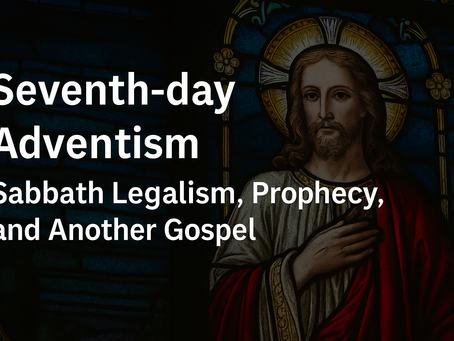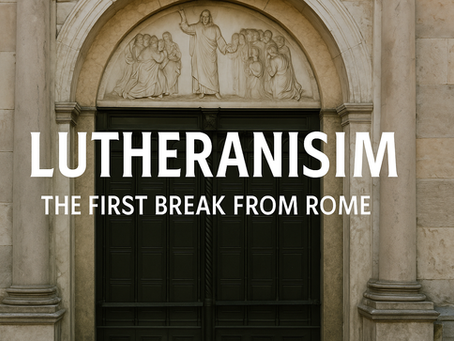top of page


Sola Scriptura vs. Tradition: Returning to the Source
Sola Scriptura vs. Tradition: Returning to the Source. The doctrine of Sola Scriptura—that Scripture alone is the supreme and sufficient authority for faith and practice—was the rallying cry of the Reformation. Yet today, it stands under fire from both extremes: those who elevate centuries of human traditions above it, and those who wield the Bible without any interpretive discipline. Between these errors lies the narrow way: handling God’s Word faithfully, humbly, and in con
4 min read


Seventh-day Adventism: Sabbath Legalism, Prophecy, and Another Gospel
Seventh-day Adventism: Sabbath Legalism, Prophecy, and Another Gospel. Seventh-day Adventism (SDA) is often misunderstood as simply another Protestant denomination. In reality, its origins and core teachings place it closer to the realm of cults. Rooted in failed prophecies, new revelations, and legalistic additions to the gospel, Adventism undermines the sufficiency of Christ’s work.
3 min read


Quakers: The Inner Light, Silence, and Doctrinal Drift
Quakers: The Inner Light, Silence, and Doctrinal Drift. The Religious Society of Friends—better known as Quakers—emerged in 17th-century England as a radical challenge to established churches. Rejecting clergy, sacraments, and outward rituals, they emphasized the “Inner Light,” a direct experience of God available to every believer. Their legacy includes social activism, pacifism, and simplicity of life. Yet while their sincerity is notable, their theology often drifts far fr
3 min read


Anabaptists: Separation, Simplicity, and Sectarianism
Anabaptists: Separation, Simplicity, and Sectarianism. The Anabaptist movement, born in the turbulent years of the 16th-century Reformation, sought to return to a “pure” New Testament faith. Rejecting infant baptism, state churches, and coercion, they became the “radicals” of the Reformation, insisting on believer’s baptism, separation from the world, and a life of visible discipleship.
3 min read


Presbyterianism: Order, Doctrine, and Endless Assemblies
Presbyterianism: Order, Doctrine, and Endless Assemblies. Presbyterianism stands as one of the most influential expressions of the Reformation, rooted in the theology of John Calvin and shaped by John Knox in Scotland. Known for its structured government of elders (“presbyters”), commitment to confessions, and intellectual rigor, Presbyterianism has left a lasting mark on Protestantism worldwide. Yet beneath its ordered exterior lies the same problem afflicting all denominati
3 min read


Methodism & Wesleyanism: Discipline, Holiness, and Division
Methodism & Wesleyanism: Discipline, Holiness, and Division. Methodism, birthed in the 18th century under John and Charles Wesley, was originally a renewal movement within the Church of England. Known for its methodical devotion, fiery preaching, and emphasis on holiness, it grew rapidly into one of the most influential Protestant traditions in the world. Yet like other denominational movements, Methodism has fractured into countless branches — United Methodists, Free Methodi
3 min read


Pentecostalism: Fire, Experience, and Doctrinal Drift
Pentecostalism: Fire, Experience, and Doctrinal Drift. Pentecostalism is one of the fastest-growing religious movements in the world, boasting hundreds of millions of adherents. It emphasizes the “baptism of the Holy Spirit,” speaking in tongues, miraculous healing, and revivalistic worship. For many, it represents a return to the book of Acts — a Christianity full of power and supernatural vitality.
4 min read


The Episcopal Church: From Anglican Roots to American Drift
The Episcopal Church: From Anglican Roots to American Drift. The Episcopal Church (TEC) is the American heir of Anglicanism, born after the American Revolution severed ties with the Church of England. It retains Anglican liturgy, bishops, and the Book of Common Prayer, but over time has charted its own course — one that often reflects American cultural trends more than biblical faithfulness.
4 min read


Anglicanism: The Middle Way or a Compromise of Truth?
Anglicanism: The Middle Way or a Compromise of Truth? Anglicanism presents itself as the “via media” — the middle way between Roman Catholicism and Protestantism. With stately liturgy, a worldwide communion, and a heritage stretching back to the English Reformation, it carries both dignity and tension. On the one hand, Anglicans emphasize Scripture, sacraments, and order; on the other, their history reveals compromise, political convenience, and a long drift into liberalism.
4 min read


Baptists: Literalism, Exclusivity, and Endless Splits
Baptists: Literalism, Exclusivity, and Endless Splits. Baptists are one of the most recognizable Protestant groups in the world, often defined by their insistence on believer’s baptism and independent church governance. Baptists claim to uphold “biblical Christianity” with a fierce loyalty to Scripture. Yet their history is one of fragmentation, hyper-literalism, and a reputation for being some of the most divisive and aggressive voices in Christendom.
4 min read


Calvinism: Predestination, Sovereignty & Rigid Tribalism.
Calvinism: Predestination, Sovereignty & Rigid Tribalism. Of all the Protestant denominations, none has shaped Western theology more than Calvinism. Emerging from John Calvin’s reforms in Geneva, it developed into a systematic theology emphasizing God’s sovereignty, predestination, and covenant. Its legacy is immense — from Puritanism to Presbyterianism to Reformed Baptists — yet it has also bred elitism, rigid doctrinal camps, and bitter divisions.
3 min read


Lutheranism: The First Break from Rome and Its Lasting Legacy
Lutheranism: The First Break from Rome and Its Lasting Legacy. Lutheranism is often celebrated as the first branch of Protestantism, when Martin Luther nailed his Ninety-Five Theses to the church door at Wittenberg. His protest against indulgences, papal abuses, and corrupt theology sparked the Reformation. Yet while Luther recovered the biblical doctrine of justification by faith, Lutheranism still carried forward many Catholic structures and introduced new fractures into th
3 min read


Protestantism: Reformation, Fracture, and the Modern Crisis
Protestantism: Reformation, Fracture, and the Modern Crisis. Many Protestants resist being called a “denomination.” They claim Protestantism is not one denomination, but rather a “movement” or simply “Christianity.” Yet in practice, it functions exactly like a denomination — an umbrella identity that covers Lutherans, Reformed, Anglicans, Baptists, Methodists, Pentecostals, Charismatics, and Non-denominationals.
4 min read


Eastern Orthodoxy: Tradition, Icons, and Division
Eastern Orthodoxy: Tradition, Icons, and Division. The Eastern Orthodox Church presents itself as the purest and most faithful expression of the “One Holy Catholic and Apostolic Church.” It claims to preserve the unbroken tradition of the apostles. But just like Roman Catholicism, Orthodoxy is not the one true faith. While Orthodoxy preserves valuable aspects of early Christianity, it also layers human traditions, Byzantine culture, and iconography onto the gospel.
5 min read


Catholicism: Tradition, Division, and the Gospel
Catholicism: Tradition, Division, and the Gospel. The Roman Catholic Church is the largest branch of Christianity, with over one billion adherents worldwide. For centuries, it has claimed to be “the one true Church” founded by Jesus Christ, the only reliable custodian of salvation and authority. But history and Scripture tell a different story. Far from being the one true church, Catholicism is one branch among many — a branch that elevated human tradition and papal authority
6 min read


How to Choose a Bible-Believing Church: A Guide for Discerning Christians
How to Choose a Bible-Believing Church: A Guide for Discerning Christians. Choosing a church isn't like shopping for a gym. It's not about which building has the best coffee, slickest branding, or most exciting programs for the kids. The local church is the pillar and foundation of the truth (1 Timothy 3:15). And that means if the foundation is cracked or the truth is compromised, your spiritual house will eventually collapse.
3 min read


What Does It Mean to Be Non-Denominational?
What Does It Mean to Be Non-Denominational?. The term “non-denominational” gets thrown around a lot these days. You’ll find it on church signs, websites, and social media bios—often paired with phrases like “Bible-based,” “Spirit-filled,” or “come as you are.” But what does “non-denominational” actually mean?
6 min read


Denominations: Are They Biblical?
Denominations: Are They Biblical? If you look around the Christian landscape today, you’ll quickly notice something peculiar: tens of thousands of different church groups called denominations, each with their own label, heritage, and often their own way of doing almost everything. To some, this diversity is proof of Christianity’s vibrancy. To others, it’s an indictment of how far we’ve drifted from Jesus’ command to be one.
7 min read


Church History
Understanding church history matters because it helps us see where our traditions come from and why so many sincere Christians have ended up divided. It teaches us to be humble about our own assumptions and to focus on what is essential.
7 min read
bottom of page